Medium frequency spot welding is a widely used technique in various industries for joining metal components. The effectiveness and quality of the welding process heavily rely on the choice of electrode materials. The materials used for the electrodes must meet specific requirements to ensure optimal performance and durability.

- Electrical Conductivity: One of the key requirements for electrode materials in medium frequency spot welding is high electrical conductivity. Good electrical conductivity ensures efficient energy transfer from the electrodes to the workpieces, resulting in a stable and reliable welding process.
- Thermal Conductivity: High thermal conductivity is also essential for electrode materials. During the welding process, a significant amount of heat is generated at the welding point. Materials with high thermal conductivity help in dissipating this heat quickly, preventing overheating and maintaining consistent weld quality.
- Mechanical Strength: Electrode materials need to have adequate mechanical strength to withstand the pressure applied during the welding process. They should not deform or break under the force exerted during the welding operation, as this would adversely affect the quality of the weld joint.
- Wear Resistance: The repeated contact between the electrodes and the workpieces, along with the heat generated, can cause wear and deterioration of the electrode tips. Materials with good wear resistance can prolong the lifespan of the electrodes, reducing the need for frequent replacements and downtime.
- Corrosion Resistance: Electrodes are often exposed to harsh welding environments that might involve the presence of moisture, chemicals, and molten metal. Corrosion-resistant materials prevent electrode degradation, ensuring consistent performance and avoiding potential contamination of the welds.
- Non-Stick Properties: Materials that have a low tendency to adhere to molten metal are preferred for electrode construction. Non-stick properties help in preventing the buildup of excess material on the electrode surface, which could lead to inconsistent welds.
- Thermal Expansion: Electrode materials should ideally have a thermal expansion coefficient that is well-matched with the workpiece materials. This helps in reducing the risk of cracking and distortion in the welded joints due to thermal expansion mismatch.
the materials chosen for medium frequency spot welding electrodes play a crucial role in determining the success of the welding process. The right materials must exhibit high electrical and thermal conductivity, mechanical strength, wear and corrosion resistance, non-stick properties, and appropriate thermal expansion characteristics. By meeting these requirements, electrode materials contribute to consistent, high-quality welds and prolonged electrode lifespan, ultimately leading to increased efficiency and cost savings in industrial welding operations.
Post time: Aug-28-2023







